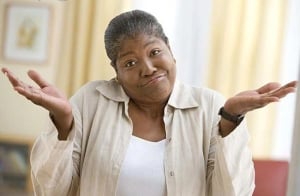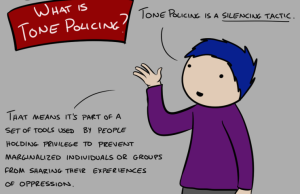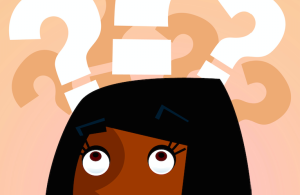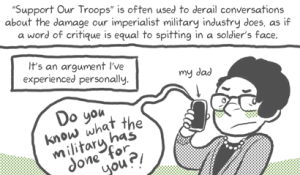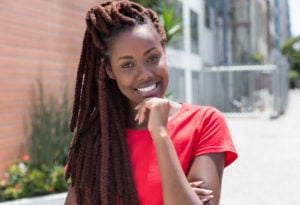
A person standing on the sidewalk in a city, smiling with their hand under their chin.
I deserve to be safe in my relationships. Do you know that you deserve safety, too?
I wasn’t always so sure that I deserved a healthy love life. As a survivor of intimate partner violence (IPV), I went through a time when I didn’t have any hope of being in a relationship without fear and shame.
But it wasn’t just an abusive partner who convinced me that I deserved mistreatment. I’m a bisexual woman – so the rest of society also perpetuates toxic ideas about my relationships, too.
If you’re also bisexual, or you have another non-monosexual identity that gets hit with stereotypes about what it means to be neither gay or straight, this will probably sound familiar.
And if you’re a bisexual woman or non-binary person who experiences misogyny, I’m writing this especially for you. Many of these myths affect bisexual people of all genders, but their patriarchal roots have a specific impact on women and other people who are pushed into society’s idea of what a woman is “supposed” to be.
Studies show that 61 percent of bisexual women experienced rape, physical violence, or stalking by an intimate partner – a higher rate than both straight women and lesbians. About 90 percent of these survivors’ abusive partners were men.
In one high-profile example, actress Amber Heard recently filed a restraining order citing abuse during divorce proceedings with actor Johnny Depp.
Unfortunately, many reactions to this news demonstrated those misogynistic and biphobic ideas about bisexual women.
Some headlines referred to Amber as only “Depp’s bisexual wife,” along with insinuations that she’s trying to take his money. Other publications suggested that she was having an affair, with headlines asking if her “lesbian friends” put a strain on the marriage.
In our sex shaming (sometimes called slut shaming) society, sexually active women are judged as “sluts,” while sexually active men are congratulated as “studs.”
Bisexual people are often sex shamed based only on our sexual orientation, regardless of how sexually active we actually are. We’re stereotyped as inherently promiscuous and unfaithful.
Sadly, it’s common for all survivors to face doubt and victim-blaming – and this case shows how biphobia can play a damaging role.
When people insult Amber Heard – and it’s your loved ones repeating hurtful lies about bisexual people – you might wonder if they’d say the same about you.
As Casey Quinlin pointed out, media publications insinuate that there’s “something shameful about bisexuality” when they describe Amber as someone who “openly admits” to being bisexual.
People wonder why survivors don’t “just leave” our partners at the first sign of violence. But it’s no wonder that it’s so difficult for us to escape, to ask for help, and to heal after we’ve been abused.
Messages all around us say that we must be lying or that we deserved what happened to us. We don’t know who of our loved ones we can trust to support us, and who will just make things worse by judging us.
So we suffer alone, in fear, with shame. You might even believe you deserve to be mistreated.
We deserve so much better than this. You already encounter toxic lies about relationships far too often, and you probably don’t get the truth that shuts down those lies nearly enough.
So in case nobody’s told you lately, here are some reminders of what you – yes you, with the non-monosexual sexuality – deserve in your relationship(s).
1. You Deserve to Seek Relationships If You Want Them
Get bombarded with biphobic lies long enough, and you’d think no bisexual person should ever be in a relationship at all.
There are people who say outright that they’d never date a bisexual person – and they encourage others to steer clear of us, too.
You might deal with men who view you only as a sexual object, and women who think you’re “not queer enough” to date them.
If you’ve had these struggles, I don’t blame you for wanting to give up. Dating can be exhausting enough for anyone, and these assumptions don’t make it any easier.
But know that you don’t have to settle for anything less than the kind of relationship you want.
For instance, if you’re looking for a long-term relationship, then you deserve to be more than someone’s threesome fantasy.
Think about what you’re hoping for, and remember that you have every right to pursue that with someone who respects you. That means you also have the right to say “no” to people who stereotype you instead.
2. You Deserve to Not Be in Relationships If You Don’t Want Them
These are mostly reminders for romantic relationships – but it’s just as important to acknowledge that it’s perfectly okay to not have interest in relationships, too.
We live in a society that says you have to be partnered to be valuable, which can make you feel obligated to “settle down.”
Plus, the pressures of biphobia can make you feel like you have something to prove. Getting into a relationship that looks good to the outside world could shut down some of the claims that you can’t commit to a partner.
But it’s what you’re feeling on the inside that counts.
Do you think your current partner might be toxic? Or need a break from dating after your last relationship?
Do you prefer casual sex to a serious relationship? Or don’t feel interested in dating or intimacy at all?
Whatever your reason, if a relationship doesn’t feel right for you, then you don’t need one to “complete” you.
You’re enough on your own. The most important thing is to take care of you, and there’s nothing wrong with being single while you do that.
3. You Deserve to Put Yourself First
Being single is one way to help prioritize self-care, but guess what?
Even in a relationship, you still deserve to put yourself first.
Of course, with another person in your life, it gets a little complicated. Communication is important, compromise is sometimes necessary, and you’re not entitled to prioritize your needs to the point of controlling another person.
But intimate partner violence is a pattern of power and control – survivors have found ourselves under a partner’s control, unable to think of our own needs at all.
We all deserve the freedom to take care of our needs.
For instance, if your partner keeps you from doing what nourishes you, like hanging out with friends, that could be a sign that they don’t support your self-care.
As long as look out for yourself, you can notice if a partner is getting in the way of your needs – and decide how to address that problem.
4. You Deserve to Not Have Your Sexuality Used Against You
It’s not okay for your partner to use any part of your identity against you – whether it’s your race, gender, disability, or anything else. And that includes your sexuality.
For example, if you’re with someone who says your bisexuality is a reason they “can’t trust you,” that doesn’t mean there’s a problem with your bisexuality.
It means your partner has some biphobic beliefs to unlearn – and that’s on them, not you.
I’m sure you already have some idea of how absurd it is for someone to think that your sexuality means you can’t be trusted. Being bisexual doesn’t mean you’re looking to cheat on a partner.
But you might feel responsible for “proving” that you can be trusted, or feel guilty about your partner’s insecurities.
You don’t have to be ashamed of who you are, just because your partner believes ridiculous stereotypes about you. If they refuse to take responsibility for working on their own unfounded insecurities, it’s not up to you to take on their burden.
5. You Deserve to Have a Life Outside of Your Relationship(s)
There’s nothing like new relationship giddiness or longtime love to make you want to spend lots of time with someone.
And there’s certainly nothing wrong with enjoying lots of time with someone who makes you happy. But if you feel like you don’t have to the freedom to do anything but spend time with your partner, that’s not a good sign.
When someone is treating you like you’re inherently untrustworthy, they might convince you that you have to spend every possible moment with them to prove that you’re loyal.
In a healthy relationship, partners are free to live their own individual lives. You share many things, but you’re still your own person, and you need to be able to do the things you love – even when that means doing things without your partner.
You may think abuse only looks like physical violence. But abuse can be emotional, too – and if a partner manipulates you, threatens you, or isolates you from your loved ones, that’s not healthy.
6. You Deserve to Be Out as Bisexual If You Want to Be
Despite an abundance of evidence to the contrary, far too many people still believe that bisexuality is a “phase” – just something you identify with until you get a partner and decide if you’re gay or straight.
If your partner believes this about you, they might cause some problems.
For instance, you could be with a man who says, “Aren’t you over that whole thing about experimenting with girls? You’re with me now.”
Or with a woman who says, “Why don’t you identify as a lesbian? Are you ashamed to be with me or something?”
Your sexuality is your own – and it’s not something for you or your partners to police or be ashamed of.
If your partner’s shaming you or saying that your bisexuality makes the two of you look bad, then they’re not giving you the support you deserve.
You might both be nervous about people’s judgments. Together, you can talk about how to deal with biphobia.
But the answer is not to internalize that biphobia and hide your identity out of shame.
Personally, I identify as bisexual regardless of who I’m with – and I could be with someone of any gender, so it’s not simply a matter of having a “gay” or “straight” relationship. I can’t be with someone who doesn’t respect that.
If you don’t feel safe being out, or you feel like part of you is missing when you’re not out, your feelings are valid and the decision is entirely up to you.
7. You Deserve to Enjoy Your Sex Life If You Want One
As a bisexual woman and a survivor of sexual violence, one of the toughest lessons for me to learn is that my sex life is my own.
The media constantly tells us that women are nothing more than objects for men’s pleasure – and bisexual women are mostly invisible unless we’re being sexualized.
Our social norms around dating, sex, and gender follow suit, as we’re often fetishized for straight people’s fantasies.
So here’s a very important reminder that those stereotypes do not define you. You are more than an object for other people’s pleasure. And you deserve your own pleasure.
This means your friend who has “always wanted to experiment with girls” isn’t being a good friend if she pressures you to have a threesome with her and her boyfriend after you’ve already told her you’re not into it.
This means if your partner demands sex to “prove” you’re attracted or loyal to them, they’re coercing you, and that’s not okay.
And this also means that if you do want to have sex – including threesomes or other adventures – that’s perfectly okay, too!
You can decide if you want to have sex with only one partner, or to have casual sex, or to have a non-monogamous relationship, and more.
Rape culture says that you don’t get to say “no” to what you don’t want. Respectability politics say that you shouldn’t say “yes” to what you do want.
But a healthy sex life includes your consent, communication, and enjoyment. You don’t have to do anything you don’t want to do, and you also get to seek out sexual partners who are willing to help you explore what you like.
8. You Deserve to Feel Safe and Respected in Your Relationship(s)
I can’t emphasize this point enough.
You deserve safety. You deserve respect. You deserve autonomy over your own body, and control over your own life.
You should never have to give these things up for the sake of a relationship. You and your needs are not disposable.
But you’re up against some absurd rules from oppressive systems that say otherwise.
Sexism, for instance, says that a “good” woman is one who sacrifices her own needs to fulfill her partner’s needs.
Heterosexism says that a “normal” relationship is one between a straight, cisgender man and a straight, cisgender woman.
Monosexism says that a “good” partner is attracted only to people who share their partner’s gender.
When you’re breaking these rules just by being you and taking care of yourself, it’s easy to internalize the belief that you’re a “bad” person who deserves to be mistreated.
If I had kept listening to society’s oppressive norms, I would’ve kept believing I was disposable – not valuable enough to be in a relationship free of abuse.
Nothing about who you are or what you do will ever mean you deserve to be abused.
You have inherent value has a human being. Plus, you’re pretty damn special – you’ve put up with all of this biphobic bullshit, and you’re still you.
So you deserve the safety that every person deserves in a relationship – and you deserve a relationship that’s going to let you bloom as the bisexual badass you that you are.
***
So, what now? If these struggles are familiar from your dates or relationships, you deserve better.
But it’s not easy to just shake off the pressures of biphobia and instantly find what you want.
This process might require some difficult steps – like breaking up with a partner, or saying “no” to potential dates who fetishize you (which could be a big chunk of them).
Ultimately, only you can know what’s best for yourself and make your own choices. So I’m not telling you what to do, and I wouldn’t judge any of your decisions.
I only want you to know that you deserve respect, and to find some hope that a healthy relationship is possible.
If you think you might be experiencing abuse, reach out to talk to someone about it.
I know it’s scary when people can be so judgmental, but it’s possible to find affirming support. Try bi-specific resources at organizations like The Network/La Red and check out the National Coalition of Anti-Violence Programs (NCAVP) to find an LGBTQIA+ anti-violence program near you.
And regardless of your current situation, I suggest shutting down the media noise and connecting with resources that affirm what bisexuality means to you.
You deserve to find love, joy, fulfillment, and more – and to have fun along the way!
[do_widget id=’text-101′]
Maisha Z. Johnson is the Digital Content Associate and Staff Writer of Everyday Feminism. You can find her writing at the intersections and shamelessly indulging in her obsession with pop culture around the web. Maisha’s past work includes Community United Against Violence (CUAV), the nation’s oldest LGBTQ anti-violence organization, and Fired Up!, a program of California Coalition for Women Prisoners. Through her own project, Inkblot Arts, Maisha taps into the creative arts and digital media to amplify the voices of those often silenced. Like her on Facebook or follow her on Twitter @mzjwords.
Search our 3000+ articles!
Read our articles about:
Our online racial justice training
Used by hundreds of universities, non-profits, and businesses.
Click to learn more







